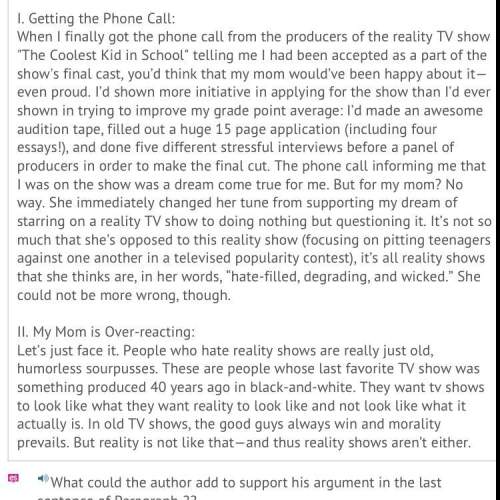
Daniella McKee is the author of Men on the Wrong Side of
History, a book about the women's suffrage movement in
Great Britain during the 1800s. She is the granddaughter of
one of the founding members of the National Society for
Women's Suffrage, a group that rallied to change laws in
the United Kingdom that prevented women from voting.
Mckee is a professor of feminist studies at Windsor
College and has written several other books on feminism
and women's rights.
Which statement best describes a bias that the author of Men on the Wrong
Side of History might have?
O A. McKee opposes a woman's right to vote.
O B. McKee opposes a woman's right to protest.
O C. McKee supports a woman's right to vote.
O D. McKee supports blocking women's voting rights.

Answers: 2
Other questions on the subject: English

English, 21.06.2019 18:00, Brianna1227
Read the excerpt from rudolfo anaya’s essay “take the tortillas out of your poetry.” tortillas and poetry. they go hand in hand. books nourish the spirit, bread nourishes our bodies. our distinct cultures nourish each one of us, and as we know more and more about the art and literature of the different cultures, we become freer and freer. . i don’t know anyone who doesn’t like to sample different ethnic foods, the breads of many many groups; just as many of us enjoy sampling books from different areas of the world. i travel to foreign countries, and i know more about myself as i learn more about my fellow human beings. censorship imposes itself in my path of knowledge, and that activity can be justified by no one. which choice best describes the purpose of this text? to persuade readers to oppose the censorship of literature to inform readers about censorship in a specific country to entertain readers with stories about censorship to motivate readers to speak out against censorship mark this and return
Answers: 2

English, 22.06.2019 00:00, montrellgoodman5890
Read this inference: "one day the neighbors will move out of the little frame house." what detail from the story best supports this inference?
Answers: 2

English, 22.06.2019 01:50, jurnee77
Plagiarism quiz read both the paragraph below and the information following it that identifies the source using the american psychological association format. then read each of the numbered statements and determine if each is plagiarized or not. circle “yes” if the statement is plagiarized, “no” if it is not, and then fix the “yes” answers). original source the presence of the taiwanese on everest was a matter of grave concern to most of the other expeditions on the mountain. there was a very real fear that the taiwanese would suffer a calamity that would compel other expeditions to come to their aid, risking further lives, to say nothing of jeopardizing the opportunity for other climbers to reach the summit. but the taiwanese were by no means the only group that seemed egregiously unqualified. camped beside us at base camp was a twenty-five-year-old norwegian climber named peter neby, who announced his intention to make a solo ascent of the southwest face, one of the peak’s most dangerous and technically demanding routes—despite the fact that his himalayan experience was limited to two ascents of neighboring island peak, a 20,274-foot bump that required little more than vigorous walking. krakauer, j. (1998). into thin air: a personal account of the mount everest disaster. new york: anchor books, 122 - 3. student samples yes 1. there was a very real fear that the taiwanese would suffer a calamity that would compel other expeditions to come to their aid(krakauer, 1998). no) 2. many climbers overestimate their abilities, as krakauer (1998) explains when he writes of peter neby, whose himalayan experience in the past “required little more than vigorous walking” (122 - 3). no 3. jon krakauer (1998) discusses other concerns besides those of unpredictable weather and his own climbing group’s capabilities. for example the existence of a taiwanese group on everest was a matter of serious unease to most everyone else on the mountain. yes/no 4. krakauer (1998) states that the taiwanese group was not the only inexpert climbers to attempt mt. everest: camped beside us at base camp was a twenty-five-year-old norwegian climber named peter neby. . [whose] himalayan experience was limited to two ascents of neighboring island peak, a 20,274-foot bump that required little more than vigorous walking (122 – 3). yes/no 5. the author asserts that the taiwanese “were by no means the only group that seemed egregiously unqualified.” yes/no 6. in his book into thin air, jon krakauer (1998) discusses many of the dangers he noted prior to his disastrous attempt to climb mt. everest in 1996. among them were encounters with other groups and individual climbers who were ill-trained and ill-equipped to handle the demands of such a climb.
Answers: 2

English, 22.06.2019 02:40, SMNS625
Constructing an argument: in modern american society, the legalization of marijuana continues to be controversial and hotly debated. some people find it contradictory that certain "drugs"—such as tobacco and alcohol—are legalized even though they pose proven health risks, while marijuana, which has many medicinal applications, continues to be illegal by the federal government. what reasons do you think the federal government gives for outlawing marijuana, and do the reasons support the conclusion?
Answers: 2
Do you know the correct answer?
Daniella McKee is the author of Men on the Wrong Side of
History, a book about the women's suffrage...
Questions in other subjects:


Biology, 05.07.2019 10:00






English, 05.07.2019 10:00

Geography, 05.07.2019 10:00

Mathematics, 05.07.2019 10:00







